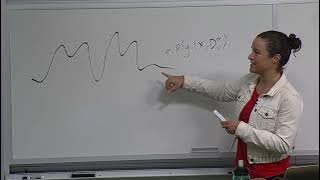
Centrality - Intro to Algorithms
This video is part of an online course, Intro to Algorithms. Check out the course here: https://www.udacity.com/course/cs215.
From playlist Introduction to Algorithms

Discrete Math - 3.1.3 Sorting Algorithms
Bubble sort and insertion sort algorithms. Textbook: Rosen, Discrete Mathematics and Its Applications, 7e Playlist: https://www.youtube.com/playlist?list=PLl-gb0E4MII28GykmtuBXNUNoej-vY5Rz
From playlist Discrete Math I (Entire Course)

Cryptographic Hash Function - Applied Cryptography
This video is part of an online course, Applied Cryptography. Check out the course here: https://www.udacity.com/course/cs387.
From playlist Applied Cryptography

Heaps Of Fun Solution - Intro to Algorithms
This video is part of an online course, Intro to Algorithms. Check out the course here: https://www.udacity.com/course/cs215.
From playlist Introduction to Algorithms

Quicksort 2 – Alternative Algorithm
This video describes the principle of the quicksort, which takes a ‘divide and conquer’ approach to the problem of sorting an unordered list. In this particular algorithm, the approach to partitioning a list does not rely on the explicit nomination of a pivot value, but still makes use of
From playlist Sorting Algorithms

Random Oracle Solution - Applied Cryptography
This video is part of an online course, Applied Cryptography. Check out the course here: https://www.udacity.com/course/cs387.
From playlist Applied Cryptography

Build a Heap - Intro to Algorithms
This video is part of an online course, Intro to Algorithms. Check out the course here: https://www.udacity.com/course/cs215.
From playlist Introduction to Algorithms

Heap Sort - Intro to Algorithms
This video is part of an online course, Intro to Algorithms. Check out the course here: https://www.udacity.com/course/cs215.
From playlist Introduction to Algorithms

Graph Data Structure 6. The A* Pathfinding Algorithm
This is the sixth in a series of videos about the graph data structure. It includes a step by step walkthrough of the A* pathfinding algorithm (pronounced A Star) for a weighted, undirected graph. The A* pathfinding algorithm, and its numerous variations, is widely used in applications suc
From playlist Path Finding Algorithms

Learning and Testing k-Model Distributions - Rocco Servidio
Rocco Servidio Columbia University April 25, 2011 A k-modal probability distribution over the domain {1,...,N} is one whose histogram has at most k "peaks" and "valleys". Such distributions are a natural generalization of the well-studied class of monotone increasing (or monotone decreasin
From playlist Mathematics

Oracle Separation of Quantum Polynomial time and the Polynomial Hierarchy - Avishay Tal
Computer Science/Discrete Mathematics Seminar I Topic: Oracle Separation of Quantum Polynomial time and the Polynomial Hierarchy Speaker: Avishay Tal Affiliation: University of California, Berkeley Date: Oct 1, 2018 For more video please visit http://video.ias.edu
From playlist Mathematics

Reproducibility in Learning - Jessica Sorrell
Computer Science/Discrete Mathematics Seminar I Topic: Reproducibility in Learning Speaker: Jessica Sorrell Affiliation: University of California San Diego Date: January 24, 2022 Reproducibility is vital to ensuring scientific conclusions are reliable, but failures of reproducibility hav
From playlist Mathematics

Stanford CS330 Deep Multi-Task & Meta Learning - Bayesian Meta-Learning l 2022 I Lecture 12
For more information about Stanford's Artificial Intelligence programs visit: https://stanford.io/ai To follow along with the course, visit: https://cs330.stanford.edu/ To view all online courses and programs offered by Stanford, visit: http://online.stanford.edu Chelsea Finn Computer
From playlist Stanford CS330: Deep Multi-Task and Meta Learning I Autumn 2022

Learning models: connections between boosting...and regularity I - Russell Impagliazzo
Computer Science/Discrete Mathematics Seminar I Topic: Learning models: connections between boosting, hard-core distributions, dense models, GAN, and regularity I Speaker: Russell Impagliazzo Affiliation: University of California, San Diego Date: November 13, 2017 For more videos, please
From playlist Mathematics

Mirrored Langevin Dynamics - Ya-Ping Hsieh
The workshop aims at bringing together researchers working on the theoretical foundations of learning, with an emphasis on methods at the intersection of statistics, probability and optimization. We consider the posterior sampling problem in constrained distributions, such as the Latent
From playlist The Interplay between Statistics and Optimization in Learning

On the possibility of an instance-based complexity theory - Boaz Barak
Computer Science/Discrete Mathematics Seminar I Topic: On the possibility of an instance-based complexity theory. Speaker: Boaz Barak Affiliation: Harvard University Date: April 15, 2019 For more video please visit http://video.ias.edu
From playlist Mathematics

Constraint Satisfaction Problems and Probabilistic Combinatorics I - Fotios Illiopoulos
Computer Science/Discrete Mathematics Seminar II Topic: Constraint Satisfaction Problems and Probabilistic Combinatorics I Speaker: Fotios Illiopoulos Affiliation: Member, School of Mathematics Date: November 19, 2019 For more video please visit http://video.ias.edu
From playlist Mathematics

Ohad Shamir - Trade-offs in Distributed Learning
In many large-scale applications, learning must be done on training data which is distributed across multiple machines. This presents an important challenge, with multiple trade-offs between optimization accuracy, statistical performance, communication
From playlist Schlumberger workshop - Computational and statistical trade-offs in learning

Running Time of Connected Component - Intro to Algorithms
This video is part of an online course, Intro to Algorithms. Check out the course here: https://www.udacity.com/course/cs215.
From playlist Introduction to Algorithms

ML Tutorial: Factor Graphs, Belief Propagation and Variational Techniques (Lennart Svensson)
Machine Learning Tutorial at Imperial College London: A Brief Introduction to Factor Graphs, Belief Propagation and Variational Techniques Lennart Svensson (Chalmers University) November 9, 2016
From playlist Machine Learning Tutorials